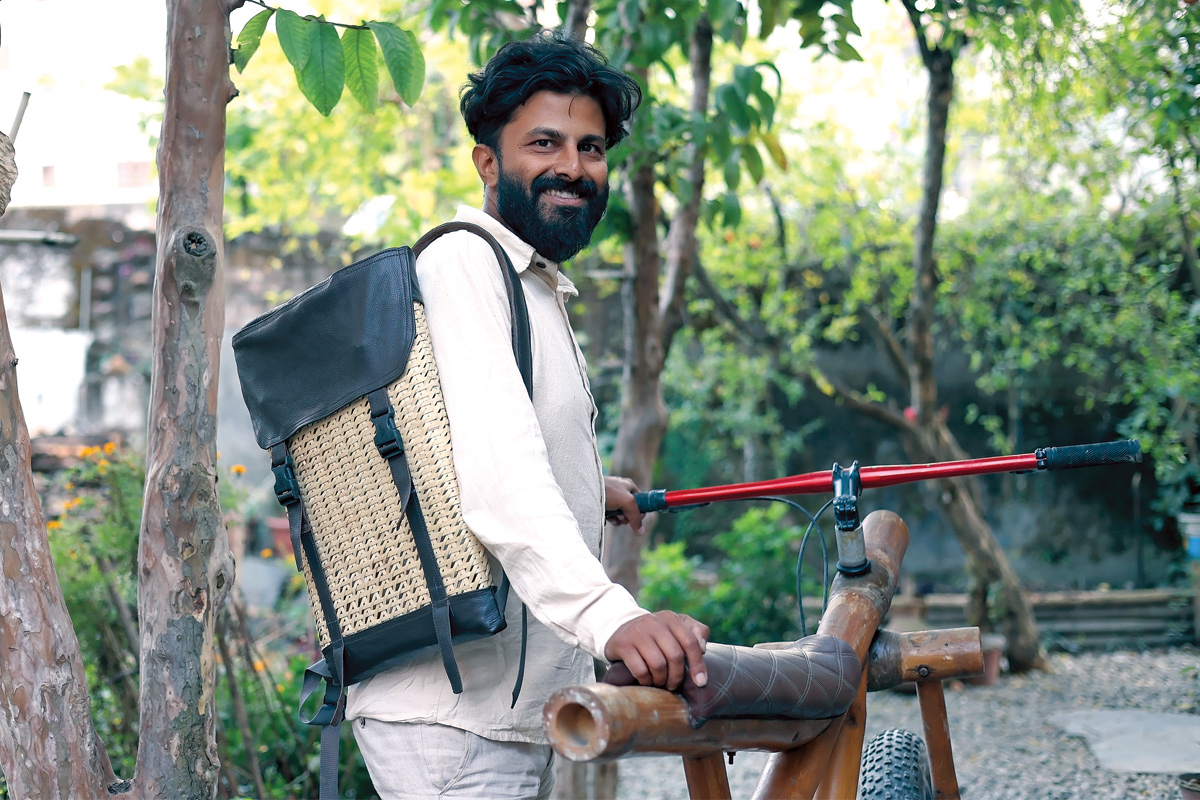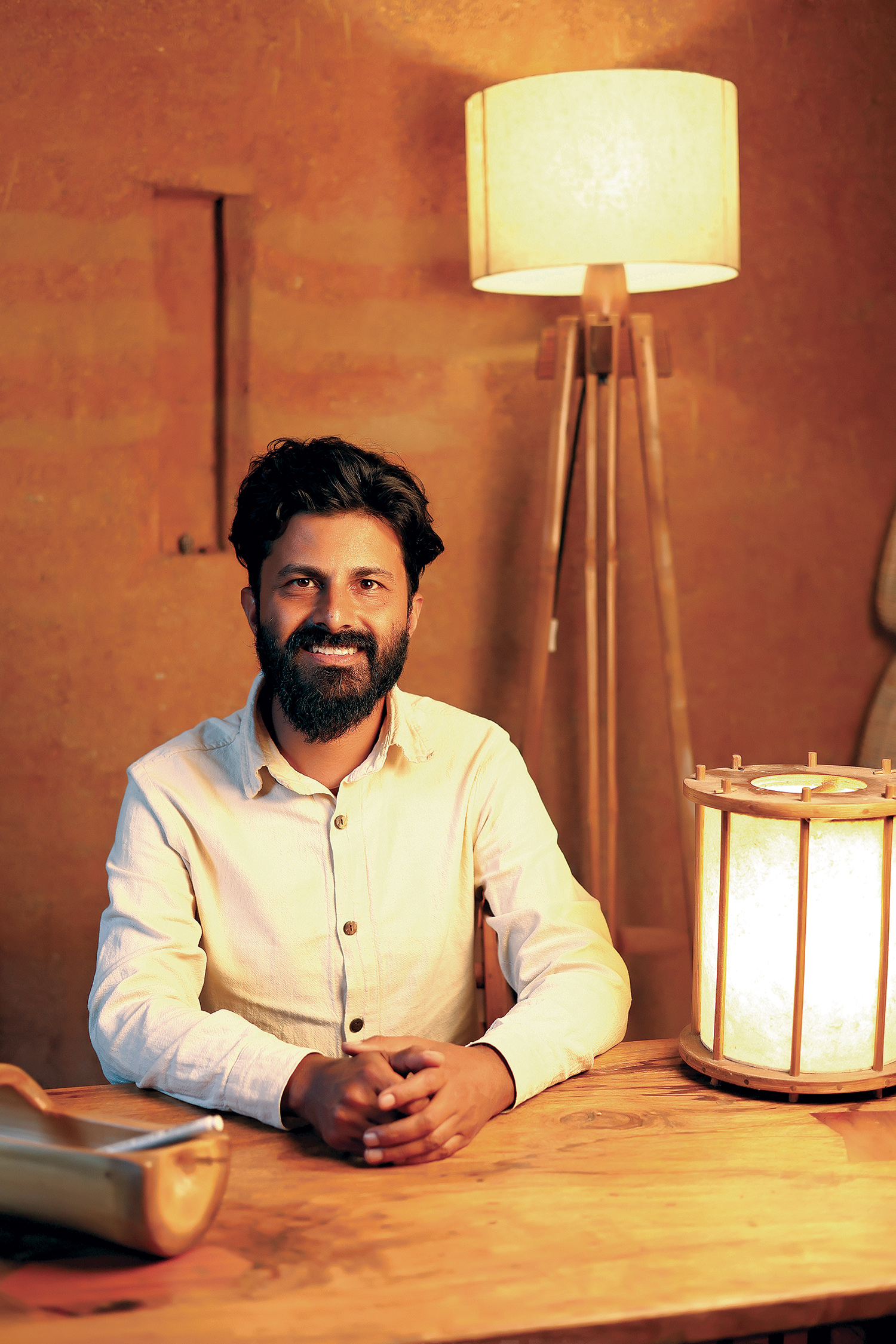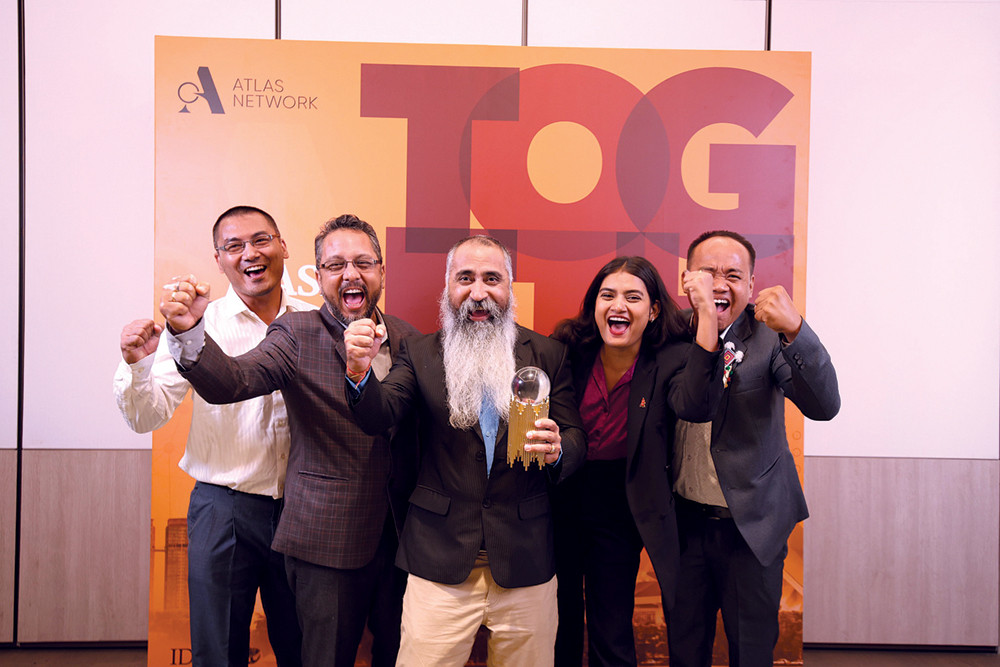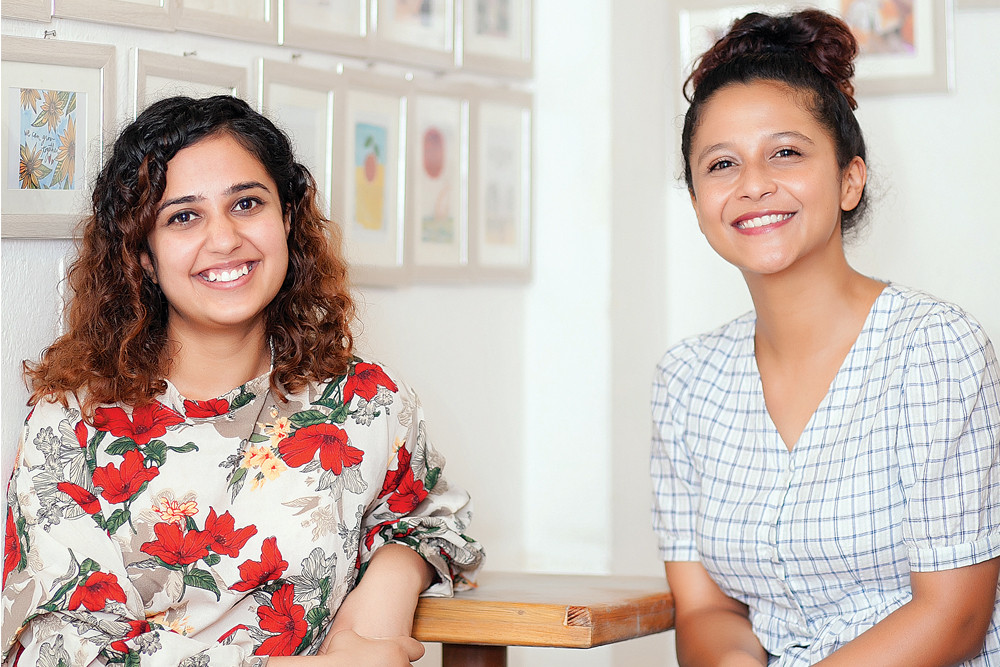
It is usually the events and experiences that we encounter during childhood that shape the person we grow up to be. Nripal Adhikari, Founder of Abari Nepal, says while growing up he had the opportunity to travel to various places within the country with his father and was fascinated by the architectural structures made of unfired bricks, mud and natural raw materials that he came across during this time.
Adhikari had enrolled for computer engineering for his undergrad studies in New York, but soon realised his deep inclination for art. “While doing my Bachelor’s I got a chance to visit New Mexico and I was fascinated by the structures I saw there,” he relates, “It was like going back to my childhood days.” He shares the trip reignited his love and enthusiasm for buildings made of unfired bricks and natural materials. “I also realised that the materials used were found in abundance in Nepal.”
But why bamboo in particular? This query cropped up because Abari Nepal is more focused on constructing buildings with bamboo as the fundamental material. “Firstly, it can be easily found in Nepal and moreover bamboo is a resistant material,” says Adhikari, adding that bacteria and insects do cause decay but he uses a technology that helps get rid of this problem. He says treating the bamboo under high pressure with certain chemicals helps the material get rid of the bacteria and insect problem and they can last for a hundred years.
One of the defining moments of his career, shares Adhikari, was when he was able to get his research published and received a call the very next day for his first project as an architect. “It was a breakthrough moment for me and I later joined the International Network for Bamboo and Rattan where I was able to hone my skills with international architects,” he states.
 Abari Nepal was established in 2013. “Right from the start I wanted to open a social enterprise, something that would have a positive impact,” he says. However, it was not smooth sailing in the initial days. He recounts the time when he collaborated with an NGO for sustainable community housing. “The locals loved the concept of bamboo houses but at the end of the day still wanted a concrete structure,” he reminisces, “It was quite disheartening at the time.”
One of the first big projects that Adhikari was contracted for was a school in Gorkha which had to be built with bamboos and local raw materials. It took him four years to complete and he realised that doing business in this manner would not be financially sustainable. But then a massive earthquake struck Nepal in 2015 and though it was a calamity of untold measures for many people, it was a silver lining for Adhikari. “All of my structures survived including the two buildings I had constructed at the epicenter and even the BBC took my interview,” he narrates. That, he says, was the beginning of the better days to come for his business. He then received the contract to build Madan Puraskar Pustakalaya, a public library in the heart of Kathmandu. “While building the library I was able to utilise my creative freedom and got more exposure from it.”
Over the years Adhikari has been recognised for his work and was also a finalist in the 2018 Architectural Review Emerging Architects Award. “As I was getting recognition, I was compelled to think about scaling my business but I didn’t want to take that route. I wanted to remain small and continue to do things that are innovative and beautiful.”
Even though Abari Nepal is focused on traditional practices and using materials that are locally sourced, Adhikari says that they cannot overlook technological advancements in building processes and utilising what is necessary to build strong and durable structures. “For instance, mud is a moisture absorbent material so we always construct a concrete base for our buildings to prevent the structure from being infested with fungus,” he shares.
When asked about the entrepreneurship trend in Nepal, he laments the lack of research and creativity. “We seriously lack innovation.”
Having gained a foothold in the domestic market, Adhikari now aims to venture into the international arena not just for the profits but to showcase and preserve indigenous ways of building and protecting the environment.
Abari Nepal was established in 2013. “Right from the start I wanted to open a social enterprise, something that would have a positive impact,” he says. However, it was not smooth sailing in the initial days. He recounts the time when he collaborated with an NGO for sustainable community housing. “The locals loved the concept of bamboo houses but at the end of the day still wanted a concrete structure,” he reminisces, “It was quite disheartening at the time.”
One of the first big projects that Adhikari was contracted for was a school in Gorkha which had to be built with bamboos and local raw materials. It took him four years to complete and he realised that doing business in this manner would not be financially sustainable. But then a massive earthquake struck Nepal in 2015 and though it was a calamity of untold measures for many people, it was a silver lining for Adhikari. “All of my structures survived including the two buildings I had constructed at the epicenter and even the BBC took my interview,” he narrates. That, he says, was the beginning of the better days to come for his business. He then received the contract to build Madan Puraskar Pustakalaya, a public library in the heart of Kathmandu. “While building the library I was able to utilise my creative freedom and got more exposure from it.”
Over the years Adhikari has been recognised for his work and was also a finalist in the 2018 Architectural Review Emerging Architects Award. “As I was getting recognition, I was compelled to think about scaling my business but I didn’t want to take that route. I wanted to remain small and continue to do things that are innovative and beautiful.”
Even though Abari Nepal is focused on traditional practices and using materials that are locally sourced, Adhikari says that they cannot overlook technological advancements in building processes and utilising what is necessary to build strong and durable structures. “For instance, mud is a moisture absorbent material so we always construct a concrete base for our buildings to prevent the structure from being infested with fungus,” he shares.
When asked about the entrepreneurship trend in Nepal, he laments the lack of research and creativity. “We seriously lack innovation.”
Having gained a foothold in the domestic market, Adhikari now aims to venture into the international arena not just for the profits but to showcase and preserve indigenous ways of building and protecting the environment.
 Abari Nepal was established in 2013. “Right from the start I wanted to open a social enterprise, something that would have a positive impact,” he says. However, it was not smooth sailing in the initial days. He recounts the time when he collaborated with an NGO for sustainable community housing. “The locals loved the concept of bamboo houses but at the end of the day still wanted a concrete structure,” he reminisces, “It was quite disheartening at the time.”
One of the first big projects that Adhikari was contracted for was a school in Gorkha which had to be built with bamboos and local raw materials. It took him four years to complete and he realised that doing business in this manner would not be financially sustainable. But then a massive earthquake struck Nepal in 2015 and though it was a calamity of untold measures for many people, it was a silver lining for Adhikari. “All of my structures survived including the two buildings I had constructed at the epicenter and even the BBC took my interview,” he narrates. That, he says, was the beginning of the better days to come for his business. He then received the contract to build Madan Puraskar Pustakalaya, a public library in the heart of Kathmandu. “While building the library I was able to utilise my creative freedom and got more exposure from it.”
Over the years Adhikari has been recognised for his work and was also a finalist in the 2018 Architectural Review Emerging Architects Award. “As I was getting recognition, I was compelled to think about scaling my business but I didn’t want to take that route. I wanted to remain small and continue to do things that are innovative and beautiful.”
Even though Abari Nepal is focused on traditional practices and using materials that are locally sourced, Adhikari says that they cannot overlook technological advancements in building processes and utilising what is necessary to build strong and durable structures. “For instance, mud is a moisture absorbent material so we always construct a concrete base for our buildings to prevent the structure from being infested with fungus,” he shares.
When asked about the entrepreneurship trend in Nepal, he laments the lack of research and creativity. “We seriously lack innovation.”
Having gained a foothold in the domestic market, Adhikari now aims to venture into the international arena not just for the profits but to showcase and preserve indigenous ways of building and protecting the environment.
Abari Nepal was established in 2013. “Right from the start I wanted to open a social enterprise, something that would have a positive impact,” he says. However, it was not smooth sailing in the initial days. He recounts the time when he collaborated with an NGO for sustainable community housing. “The locals loved the concept of bamboo houses but at the end of the day still wanted a concrete structure,” he reminisces, “It was quite disheartening at the time.”
One of the first big projects that Adhikari was contracted for was a school in Gorkha which had to be built with bamboos and local raw materials. It took him four years to complete and he realised that doing business in this manner would not be financially sustainable. But then a massive earthquake struck Nepal in 2015 and though it was a calamity of untold measures for many people, it was a silver lining for Adhikari. “All of my structures survived including the two buildings I had constructed at the epicenter and even the BBC took my interview,” he narrates. That, he says, was the beginning of the better days to come for his business. He then received the contract to build Madan Puraskar Pustakalaya, a public library in the heart of Kathmandu. “While building the library I was able to utilise my creative freedom and got more exposure from it.”
Over the years Adhikari has been recognised for his work and was also a finalist in the 2018 Architectural Review Emerging Architects Award. “As I was getting recognition, I was compelled to think about scaling my business but I didn’t want to take that route. I wanted to remain small and continue to do things that are innovative and beautiful.”
Even though Abari Nepal is focused on traditional practices and using materials that are locally sourced, Adhikari says that they cannot overlook technological advancements in building processes and utilising what is necessary to build strong and durable structures. “For instance, mud is a moisture absorbent material so we always construct a concrete base for our buildings to prevent the structure from being infested with fungus,” he shares.
When asked about the entrepreneurship trend in Nepal, he laments the lack of research and creativity. “We seriously lack innovation.”
Having gained a foothold in the domestic market, Adhikari now aims to venture into the international arena not just for the profits but to showcase and preserve indigenous ways of building and protecting the environment.
Published Date: December 14, 2021, 12:00 am
Post Comment
E-Magazine
RELATED Innovation


.jpg)


.jpg)